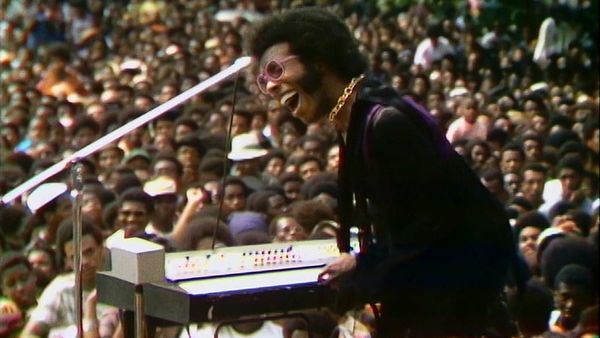Eye For Film >> Movies >> Summer Of Soul (...Or, When The Revolution Could Not Be Televised) (2021) Film Review
Summer Of Soul (...Or, When The Revolution Could Not Be Televised)
Reviewed by: Amber Wilkinson

In the US, February is designated Black History Month and there were a number of films at Sundance this year acting as a illustration of why this sort of additional focus remains so necessary. Watching documentaries like this debut from Ahmir “Questlove” Thompson, My Name Is Pauli Murray and Ailey is a reminder of how many vital stories about African-American pioneers and communities have been, if not completely erased, then most certainly left out in the cold by historical chroniclers.
This joyous celebration of the 1969 Harlem Cultural Festival – which an initial intertitle notes happened in the same year as Woodstock – not only features some electrifying performances but also takes a whistle-stop tour through some of the key politics, news stories and cultural developments of the era. British viewers who remember the TV show The Rock 'n' Roll Years, will find a similar, though ultimately more complex, structure at play, as the music of the era is dovetailed with archival news footage and interviews with some of those who were there.
The end result is a triumph of editing from Joshua L Peterson (What Happened, Miss Simone?) and archival research, which brings the vibrancy of this six-week free concert series that drew a crowd of 300,000 to the fore, while also leaving room to ask questions about how this footage came to languish in a basement for 50 years and the, more general, importance of seeing a history you remember immortalised on screen.
Thompson - who took home both the US Doc Grandy Jury Prize and Audience Award at Sundance - is certainly on to a winner in terms of content, with performances including The 5th Dimension’s Aquarius/Let The Sun Shine In, Nina Simone’s Young Gifted And Black, along with gospel from Mahalia Jackson, and Stevie Wonder, who sings and puts in some serious beats on a drumkit. The music is, as you would expect, incredible, but there’s also a quirkiness to all this live performance – from Wonder being followed around the stage by someone holding an umbrella over him to the Pips putting on the smooth moves as the then up-and-coming Gladys Knight belts out I Heard It Through The Grapevine. This is coupled with a ‘going to church’ element of some of what was presented, not only through Gospel music but speeches from the likes of the Reverend Jesse Jackson recalling the assassination of Martin Luther King – moments that have a spiritual purity and resonance that put me in mind of Aretha Franklin in last year’s Amazing Grace, another film that waited far too long to see the light of day.
Thompson’s idea of playing back the footage to some of the stars and audience as a way of beginning a conversation about the event has a striking immediacy. There’s a difference between talking about something you remember and talking about something you have just watched on screen – something to think about when you see yet another documentary about another old white guy who has already had 15 films made about him.
The recollections of people like The 5th Dimension’s Marilyn McCoo and Billy Davis Jr, along with audience members including Musa Jackson and Dorinda Drake, open the door for Thompson to spin out into broader considerations of everything from the rise in the popularity of dashiki fashion to the ramifications of the deaths of JFK and King the year before to the Black Panthers and civil rights movements of the time. Some of the contributors touch on prejudice, such as McCoo’s dissection of the ridiculous suggestion that 5th Dimension had “a white sound” but there’s also a wealth of anecdote here, such as the lost wallet that led to her band’s recording of Aquarius and reminiscences about the event’s organiser Tony Lawrence, whose larger than life personality and boss-level hustling brought it to life. If there's one thing you want from this film, it's more - more of the performances, more of intricacies of the politics and cultural shifts of the time - but Thompson crams every second of this two-hour film with information.
The theme of this year's Black History month is The Black Family: Representation, Identity and Diversity - it may be long overdue but it's here in all its glory, don't miss it.
Reviewed on: 04 Feb 2021

















